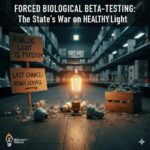
Many of the principles I teach are pretty much opposite from what mainstream health and fitness espouses. The reasons for that are myriad, but don’t get me started because that could be another whole big, long post itself.
Here’s the bottom line. We need sunlight and every one if its wonderful, beneficial wavelengths to get inside our eyes and to hit our skin for optimal health. It’s really quite simple: We were designed for sunlight and if we don’t get it, we become unhealthy.
Sure, too much sunlight is bad for you, especially if you let your skin burn. Too much direct sunlight in your eyeballs can blind you too, but this doesn’t mean the sun deserves the bad rap it’s been given by mainstream “health” information.
Vitamin D is vital to your health. In fact, most progressive health practitioners have deemed it the most important vitamin. Some experts even claim that it should be reclassified as a hormone because of how important it is to our health and biological functions. Recently it has been shown to prevent multiple sclerosis, depression and especially skin cancer! Surprised? I’m not.
Taking vitamin D as a supplement is all fine and dandy, but there’s no more bioavailable source of this vital nutrient than the kind manufactured by your own skin. Since the skin can only manufacture vitamin D when sunlight hits it, it makes sense to get some amount of sun as often as you can. How much is enough? It doesn’t take much. In fact, for most skin types, 10 to 15 minutes of sunlight 3-4 times a week on the skin is enough. How much skin? About as much as would be exposed on your face, neck and arms if you were wearing short sleeves.
Most of the cells in your body have light sensors and when those light sensors get a dose of sunlight, with all its various beneficial wavelengths, they get happy, increase activity, promote healing, reduce inflammation and even change your mood and attitude. Letting sun hit your skin, the photoreceptors in your cells, and the receptors in your eyes also help improve your sleep quality because that type of light is a big part of setting your natural circadian rhythms. When you get quality sleep, you are better able to burn off body fat and build muscle, so it also contributes to being fit and lean.
As I said above though, too much can be a bad thing, so if you are out in the sun long enough to get a burn (even a slight pink color), by all means, use shade and sunscreen to prevent that.
This brings us to another important topic: Sunscreen. Most sunscreens are highly toxic and the higher the SPF, the more poisonous chemicals it contains. These toxins have been found to increase the chances of cancer, so doesn’t that seem like the purposes being defeated? Besides, sunscreens with a higher SPF are a waste of money anyways. SPF 8 block 87% of UVB rays (the ones that burn your skin). SPF 15 sunscreens filter out about 93%. SPF 30 blocks 97%. SPF 100 sunscreens block 99%. And despite that high SPF, you’re still not protected against UVA rays, which reach deeper levels of skin and increase your risk of developing certain types of skin cancer.
With my skin type, I typically start to get pink within about 45 minutes at my current latitude in Seattle Washington, but when I’m in the tropics, I start to pink up in about half that time. Because I know this, I am great at finding shade when I need it, but I also use organic sunscreens. They work just as well, if not better, but without the poisons. You can find organic sunscreens at places like Whole Foods, PCC and other natural food stores. You can also easily order it on Amazon or through high quality health sites like Mercola.com. Yes, orgainc sunscreen about twice as expensive as the mainstream brands, but I hear getting a major disease is REALLY expensive…
Lastly, the latitude you live in makes a big difference. If you are close enough to the equator where the seasons and lengths of daylight don’t change more than a couple hours, then you will get enough quality sunlight all year round. If you are in a higher latitude like I am, you won’t be able to get enough quality sunlight for optimal health benefits about half the year, namely, from the end of October to the end of April. During those months, vitamin D3 supplement with vitamin K2 is vital and necessary.
Bottom line: The worst thing you could do is to be afraid of the sun and keep yourself out of it. Doing that will increase your chances for many different kinds of disease and depression. So my recommendation is to seek out the sun and enjoy it as often as you can but know your limits.









